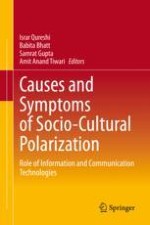2022 | OriginalPaper | Buchkapitel
A Comprehensive Review on Countering Rumours in the Age of Online Social Media Platforms
verfasst von : Amir Ebrahimi Fard, Trivik Verma
Erschienen in: Causes and Symptoms of Socio-Cultural Polarization
Verlag: Springer Singapore
Aktivieren Sie unsere intelligente Suche, um passende Fachinhalte oder Patente zu finden.
Wählen Sie Textabschnitte aus um mit Künstlicher Intelligenz passenden Patente zu finden. powered by
Markieren Sie Textabschnitte, um KI-gestützt weitere passende Inhalte zu finden. powered by
